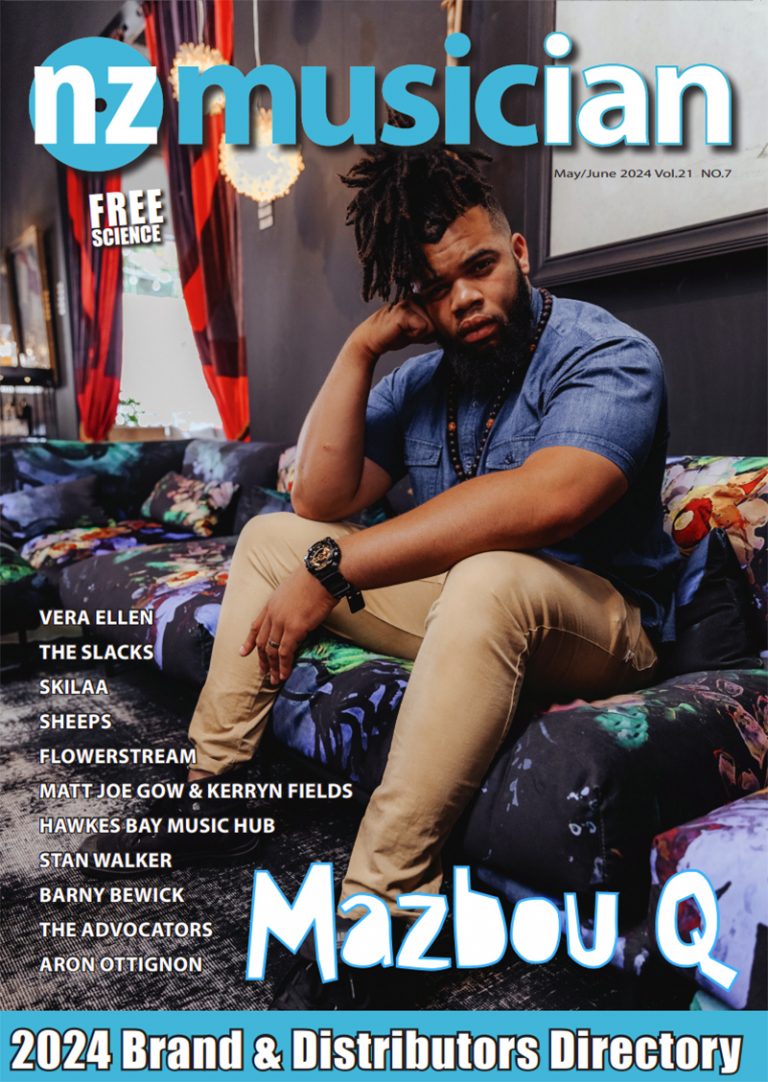Nikita Tu-Bryant: Recording with Rangi
Nikita Tu-Bryant: Recording with Rangi
On the south coast of Wellington, hidden away from the city, still in hearing distance from the airport but where the ocean laps gently on the sand, Nikita Tu-Bryant recorded an album in the back of her van. With the back door open to let in the breeze, in one very raw and personal session she let go of eight songs that had been brooding in her mind. Karin Vincent talked to Tu-Bryant about the concept for that new album ‘(Before, And After) Joshua’, the process and the story behind the story.
Nikita Tu-Bryant was born in Taiwan’s capital Taipei, moving to Auckland before she was four. Introduced to music with violin lessons from the age of five, she soon developed a keen musical ear. It was her NZ-born dad who introduced her to the electric guitar at 10. By 15 she was playing in pubs and, alongside her musical chops, was starting to develop her tenacity and skill as a performer. She went on to study jazz at the NZ School of Music in Wellington.
“This album is evidently about love, a love story,” Tu-Bryant opens, hidden away in the quietest possible corner of the departure lounge at Auckland’s international airport. I can hear the clinking of cups and clanging of the announcement bell as she sheds light on the concept of her latest collection, an album tiltled ‘(Before, and After) Joshua’.
“In its lightness and in its darkness, because everything is contextual, one cannot exist without the other. This is simply a record of one girl’s love journey. Relatable or not relatable, I really wanted to make it as honest and truthful as possible – hence the very raw recording.”
As with our interview, album listeners are transported to Nikita’s world throughout the album, the audible surroundings all included, left in as it was at that moment. It’s like you are perhaps in the front seat, listening in. The sonic drones of an aircraft landing or taking off are not filtered or cut away, but remain as part of the ‘realness’, a truthful awakening to the journey Nikita is taking you on.
“The beauty of recording as a solo artist is you only have yourself to make sure you are happy with the end result. With technology we can spend forever re-recording and re-recording, polishing and polishing. I really wanted to let this story go as soon as I could, because it was actually part of my grieving of this experience and I needed to do it then and there. I care more about the story than the quality.”
Her van, Rangi, plays an essential role in this particular story – the story of love that ignites, love that conquers and then love which had to be let go. While roaming from bay to mountain, river to forest in NZ, Rangi was home to the couple who first met by chance in an airport on another continent thousands of miles away, while in transit to opposite directions. Joshua, she explains, is not his name, rather a place.
Nikita investigates the abstract while remaining a storyteller. She teaches that the most vital attitude towards creativity, especially in regards to writing music, is to be careful not to judge it as you are creating.
“It’s very fragile, and having it be judged while you are creating limits the possibilities. You almost have to unlearn what you already know and approach each piece of art with naivety and clear canvas as a child would have, like exploring the piano for the very first time.”
The 28 year-old’s popular Wellington band, Nikita the Spooky and a Circus of Men, features double bass, cello, violin and guitar. She also plays in Flite, alongside Ed Zuccollo and Rick Cranson, somehow finding time to work on another solo project, a play, which she describes as her biggest endeavour yet.
The five-episode play, named Tide Waits For No Man, involves multiple storytelling techniques, or mediums, that she has been exploring for the past couple of years across the globe. One of those is puppetry – the reason for her imminent departure for LA, from where she is heading to Vermont to take up studying with master puppeteer Peter Schumann. He created the Bread and Puppet Theater which performed very popular and politically radical shows during the ’60s and ’70s.
The CD version of her album features a hand printed cactus on the front. The influence of the water and the desert on his collection of work further reflected in the mono-coloured print on its brown, recycled paper cover.
“The ocean has taught me that nature does what nature wants. It has taught me to be patient, to be present and it’s taught me the wonder of not knowing the time.”

